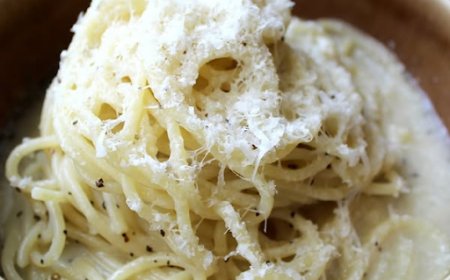Top 10 El Paso Spots for International Cuisine
Introduction El Paso, Texas, sits at the vibrant crossroads of cultures, where Mexican traditions blend with American influences and global flavors find a home. This border city is far more than a transit point—it’s a culinary destination that quietly rivals major metropolitan food scenes. From family-run taquerias to upscale Ethiopian eateries, El Paso offers an extraordinary diversity of interna
Introduction
El Paso, Texas, sits at the vibrant crossroads of cultures, where Mexican traditions blend with American influences and global flavors find a home. This border city is far more than a transit point—it’s a culinary destination that quietly rivals major metropolitan food scenes. From family-run taquerias to upscale Ethiopian eateries, El Paso offers an extraordinary diversity of international cuisine, all rooted in authenticity and community trust.
But in a city teeming with dining options, how do you know which spots truly deliver on flavor, quality, and cultural integrity? Not every restaurant that claims “authentic” Thai or “homemade” Lebanese actually delivers. Some rely on gimmicks, diluted recipes, or imported shortcuts. Others are run by immigrants who carry generations of culinary knowledge across borders—and serve it with pride.
This guide highlights the top 10 El Paso spots for international cuisine you can trust. These are not just popular restaurants—they are institutions. They’ve earned their reputation through consistency, transparency, and a deep respect for the traditions they represent. Whether you’re a long-time resident or a visitor seeking genuine global flavors, these 10 establishments offer meals that tell stories, honor heritage, and satisfy the soul.
Why Trust Matters
In the world of international cuisine, trust isn’t just about food safety or cleanliness—it’s about cultural authenticity. When you dine at a restaurant serving dishes from another country, you’re not just eating; you’re participating in a cultural exchange. A poorly executed version of a traditional dish can misrepresent an entire people’s heritage. Conversely, a well-prepared, authentic meal can be a bridge of understanding, respect, and appreciation.
Trust is built over time. It comes from owners who source ingredients from their home countries, who cook using family recipes passed down through generations, and who prioritize flavor over profit. It’s found in restaurants where the staff speaks the native language, where the music playing in the background is from the region, and where the menu hasn’t been watered down to suit “American palates.”
El Paso’s unique position as a border city means it has long been a magnet for immigrants from Latin America, the Middle East, Asia, and Africa. Many of these communities have established businesses that serve not only their own people but also curious locals and visitors. The most trusted spots are those that have survived economic shifts, changing trends, and even pandemic closures—not because they chased popularity, but because they stayed true to their roots.
When you choose a trusted restaurant, you’re supporting more than a business—you’re supporting a family, a culture, and a legacy. You’re ensuring that these culinary traditions continue to thrive, evolve, and be shared with future generations. In this guide, we’ve selected only those establishments that have demonstrated unwavering commitment to authenticity, quality, and community. These are the places where you can dine with confidence, knowing you’re experiencing the real thing.
Top 10 El Paso Spots for International Cuisine
1. La Taqueria del Barrio
More than just a taqueria, La Taqueria del Barrio is a cultural landmark in East El Paso. Founded in 1992 by a family from Guadalajara, this unassuming storefront has become the go-to destination for authentic Mexican street food. Their al pastor is marinated in achiote, pineapple, and dried chilies for 48 hours before being slow-roasted on a vertical spit—a technique learned from their grandfather in Mexico City. The tortillas are made fresh daily from nixtamalized corn, ground on-site using a traditional metate stone. Their handmade salsas, including the fiery salsa macha and smoky chipotle crema, are served without compromise. Regulars know to ask for the “Taco de Cabeza,” slow-braised beef head with tender, gelatinous textures and rich, unctuous flavor. No English menu exists here—only Spanish—but the staff welcomes everyone with warmth and patience. This is not a tourist trap. It’s a family’s life’s work, preserved in every bite.
2. Tigris & Euphrates
Nestled in a quiet strip mall near the University of Texas at El Paso, Tigris & Euphrates is El Paso’s only authentic Iraqi restaurant. Opened in 2008 by a refugee family who fled Baghdad during the U.S. invasion, the restaurant offers dishes rarely found outside the Middle East. Their signature dish, masgouf, is a whole grilled carp marinated in tamarind, turmeric, and garlic, then slow-roasted over charcoal—an ancient Mesopotamian technique. The kubba hamud, dumplings filled with spiced lamb and pine nuts, are handmade daily. The aroma of cardamom coffee and rosewater desserts lingers in the air. The owners refuse to alter recipes for American tastes, and their insistence on using imported Iraqi dates, sumac, and za’atar has earned them a loyal following among expats and food adventurers alike. Their commitment to preserving culinary heritage has made them a quiet pillar of El Paso’s cultural mosaic.
3. El Jardín de la India
El Jardín de la India is a rare gem in the Southwest, offering traditional North Indian cuisine with a focus on regional authenticity. Run by a husband-and-wife team from Lucknow, the restaurant uses a clay tandoor oven imported from India to bake naan and charbroil meats. Their butter chicken is made with 24-hour marinated chicken, simmered in a sauce of tomato, cream, and a blend of 11 spices, including kasuri methi and mace—ingredients rarely found in American Indian restaurants. The vegetarian thali is a masterpiece: seven small dishes, each representing a different state of India, served on a stainless steel platter with seasonal raita and pickled mango. The owners insist on using only organic, locally sourced produce when possible, and they grind their own spice blends daily. The dining room is decorated with hand-painted murals of Indian festivals, and live sitar music plays on weekends. This is not “Indian food” as Americans know it—it’s the real thing, served with dignity and depth.
4. Casa de la Salsa
Don’t be fooled by the name—Casa de la Salsa is not a Mexican restaurant. It’s a Salvadoran powerhouse. Opened in 2005 by a mother and her three daughters from Santa Ana, this family-run eatery specializes in pupusas, the national dish of El Salvador. Their masa is made from heirloom corn, ground fresh each morning. The fillings—cheddar and loroco, chicharrón, and revueltas—are stuffed by hand and cooked on a comal until the edges crisp. Their curtido, a fermented cabbage slaw with oregano and vinegar, is made in large batches and aged for three days. The restaurant also serves yuca frita with chirmol and sopa de pata, a rich tripe soup traditionally eaten on Sundays. The walls are adorned with photos of the family’s journey from El Salvador to El Paso, and the matriarch still greets every guest personally. Locals know that if you want the most authentic pupusas in the region, this is the only place to go.
5. Saffron & Spice
Saffron & Spice brings the bold, aromatic flavors of Iran to El Paso. Founded in 2012 by a chef who trained in Tehran’s famed restaurants, this intimate space serves dishes rarely seen outside of Persian households. Their tahdig—the crispy golden crust at the bottom of the rice pot—is considered a work of art. Made with basmati rice, saffron, and butter, it’s served as a separate delicacy. Their ghormeh sabzi, a slow-cooked stew of lamb, dried limes, fenugreek, and herbs, is simmered for 12 hours and served with Persian flatbread. The restaurant also offers fresh herbal teas, including rose petal and mint, and homemade halva made with sesame and pistachio. The owners import dried limes, barberries, and rosewater directly from Shiraz and Isfahan. Their menu changes seasonally, based on the availability of fresh herbs and produce. This is Persian cuisine at its most refined, served in a warm, minimalist space that feels like a home kitchen in Tehran.
6. La Cueva de los Sabores
La Cueva de los Sabores is a Colombian haven tucked into a residential neighborhood near the Franklin Mountains. Opened in 2010 by a family from Medellín, this restaurant is renowned for its bandeja paisa, a mountainous platter of red beans, chicharrón, fried plantains, arepa, avocado, and a perfectly grilled egg. Their ajiaco, a hearty potato soup with three types of tubers, chicken, and guascas herb, is simmered for hours and served with capers and cream. The empanadas are hand-folded with a corn dough that’s been fermented overnight. The owners source their Colombian coffee beans directly from family farms in the Quindío region, and their homemade aguapanela is sweetened with panela sugar from the Andes. The walls are lined with photos of Colombian landscapes and vintage vinyl records of vallenato music. This is not a themed restaurant—it’s a slice of Colombia, recreated with love and precision.
7. Miso & Matcha
Miso & Matcha is El Paso’s most trusted Japanese restaurant, and one of the few that employs a chef trained in Kyoto. The owner, Kenji Tanaka, moved from Osaka in 2007 and opened this quiet, minimalist space with a focus on seasonal, sustainable ingredients. Their sushi is made with fish delivered twice weekly from Japan, and the rice is seasoned with a proprietary blend of rice vinegar, sea salt, and kombu. Their dashi broth for miso soup is made from scratch using dried bonito flakes and kelp imported from Hokkaido. The ramen is slow-simmered for 18 hours with chicken, pork, and shiitake, then topped with chashu pork that melts at the touch of a fork. Even their matcha is ceremonial grade, whisked by hand. No MSG is used. No artificial flavors. No shortcuts. The menu changes monthly based on the Japanese calendar and seasonal harvests. This is not “Japanese fusion.” It’s Japanese cuisine as it’s meant to be eaten—with reverence, precision, and quiet elegance.
8. Zawia Kitchen
Zawia Kitchen is El Paso’s only authentic Eritrean restaurant, and one of the very few in the entire Southwest. Opened in 2015 by a mother and daughter who fled conflict in Asmara, the restaurant serves injera—sourdough flatbread made from teff flour—and stews called wats, slow-cooked with berbere spice, niter kibbeh (spiced clarified butter), and onions. Their key wot, a spicy beef stew, is simmered for over 10 hours and served with homemade injera that’s fermented for three days. The dining experience is communal: guests sit on low stools and eat from a shared platter, tearing off pieces of injera to scoop up the stews. The owners import teff, berbere, and niter kibbeh directly from Eritrea. They also offer traditional coffee ceremonies, where green coffee beans are roasted over charcoal and brewed in a jebena pot. This is more than a meal—it’s a ritual, a cultural experience, and a testament to resilience.
9. El Mirador de la Costa
El Mirador de la Costa brings the flavors of coastal Peru to the high desert of El Paso. Founded by a chef from Trujillo who trained under renowned Peruvian culinary masters, this restaurant specializes in ceviche, tiradito, and anticuchos. Their ceviche is made with fresh sea bass marinated in lime juice, ají amarillo, red onion, and sweet potato—served with cancha (toasted corn) and choclo (giant-kernel corn). Their lomo saltado, a stir-fry of beef, tomatoes, onions, and fries, is a beloved fusion dish that reflects Peru’s Chinese immigrant heritage. The restaurant sources its fish daily from the Pacific coast via air freight, and uses imported Peruvian corn, rocoto peppers, and huacatay herb. Their pisco sour is made with authentic pisco from the Ica region, shaken with egg white and lime. The dining room overlooks a small courtyard with Andean textiles and murals of Machu Picchu. This is Peruvian cuisine in its purest form, served with the pride of a nation.
10. Bistro des Îles
Bistro des Îles is El Paso’s sole Caribbean restaurant, offering the vibrant, spicy, and aromatic flavors of the French Antilles and Haiti. Run by a family from Guadeloupe, the restaurant specializes in accras (salt cod fritters), griot (fried pork with citrus marinade), and tassot (spiced, dried beef). Their rice and peas is cooked with coconut milk and thyme, and their plantains are fried twice for perfect caramelization. The secret to their jerk seasoning? A blend of allspice, Scotch bonnet peppers, and fresh thyme, ground fresh daily. Their sorrel drink, made from hibiscus flowers and ginger, is served chilled and spiked with rum. The walls are painted in bright Caribbean colors, and calypso music plays softly in the background. This is not a tourist version of Caribbean food—it’s the real deal, cooked with the same methods used in home kitchens across the islands. For those seeking bold, unapologetic flavors, this is the destination.
Comparison Table
| Restaurant | Cuisine | Authenticity Level | Owner Origin | Signature Dish | Imported Ingredients | Cultural Experience |
|---|---|---|---|---|---|---|
| La Taqueria del Barrio | Mexican | High | Guadalajara, Mexico | Taco de Cabeza | Dried chilies, nixtamal corn | Spanish-only menu, family recipes |
| Tigris & Euphrates | Iraqi | Very High | Baghdad, Iraq | Masgouf | Sumac, dried lime, za’atar | Traditional seating, Arabic music |
| El Jardín de la India | Indian | High | Lucknow, India | Butter Chicken | Kasuri methi, mace, ghee | Live sitar, thali platters |
| Casa de la Salsa | Salvadoran | Very High | Santa Ana, El Salvador | Pupusas | Loroco, handmade masa | Family photos, daily prep |
| Saffron & Spice | Iranian | High | Lucknow, Iran | Tahdig | Barberries, rosewater, dried limes | Seasonal menu, Persian tea ceremony |
| La Cueva de los Sabores | Colombian | Very High | Medellín, Colombia | Bandeja Paisa | Panela sugar, Colombian coffee | Vallenato music, Andean decor |
| Miso & Matcha | Japanese | Very High | Osaka, Japan | Ramen | Bonito flakes, matcha, sake | Minimalist design, seasonal changes |
| Zawia Kitchen | Eritrean | Very High | Asmara, Eritrea | Key Wot | Teff flour, berbere, niter kibbeh | Communal eating, coffee ceremony |
| El Mirador de la Costa | Peruvian | High | Trujillo, Peru | Ceviche | Ají amarillo, rocoto, pisco | Andean murals, Pacific fish delivery |
| Bistro des Îles | Caribbean | Very High | Guadeloupe, France | Griot | Scotch bonnet, allspice, coconut milk | Calypso music, communal dining |
FAQs
Are these restaurants expensive?
Not at all. While some offer fine dining experiences, the majority of these establishments are affordably priced, with most main dishes ranging from $10 to $18. Many offer lunch specials and family platters that provide excellent value. The focus is on quality ingredients and traditional preparation—not upscale pricing.
Do these restaurants accommodate dietary restrictions?
Yes. Most of these restaurants are happy to accommodate vegetarian, vegan, gluten-free, or halal requests, especially since many traditional dishes are naturally plant-based or can be adapted. Always inform the staff of your needs—they are accustomed to answering questions and often appreciate the interest in their cuisine.
Can I find these restaurants without a car?
Most are located in accessible neighborhoods with parking available. Several are near public transit routes, and ride-sharing services operate reliably throughout El Paso. While not all are in downtown, they are spread across the city in residential and commercial areas that are easy to reach.
Do these restaurants offer takeout or delivery?
Yes. All ten restaurants offer takeout, and most partner with local delivery services. However, many dishes—especially those involving fresh bread, rice crusts, or delicate sauces—are best enjoyed in-house. If you order for takeout, ask for tips on reheating to preserve texture and flavor.
Why are some menus in foreign languages?
These restaurants often serve primarily members of their own communities, and many owners are not fluent in English. The use of native languages reflects authenticity, not exclusion. Staff are typically bilingual and will gladly help you navigate the menu. This is part of the cultural experience.
Are these restaurants family-friendly?
Absolutely. Many of these spots are frequented by families, and children are welcomed with open arms. Some even offer kid-sized portions or simple dishes like grilled plantains or plain rice. The atmosphere is warm and communal, making them ideal for multi-generational dining.
Do these restaurants ever change their menus?
Yes, especially those that follow seasonal or regional traditions. Saffron & Spice, Miso & Matcha, and El Mirador de la Costa update their offerings monthly based on ingredient availability and cultural calendars. This ensures freshness and honors the rhythms of the cuisine’s origin.
How can I support these businesses?
Visit regularly, bring friends, leave thoughtful reviews, and share your experiences on social media. Avoid ordering “Americanized” versions of dishes—instead, trust the menu as written. Supporting authenticity means preserving culture.
Conclusion
El Paso’s international food scene is not a collection of trendy fusion spots or generic ethnic restaurants—it’s a living archive of global heritage, preserved by immigrant families who chose to build their lives here. These ten restaurants are more than places to eat; they are anchors of community, resilience, and identity. Each one carries the weight of a journey, the memory of a homeland, and the quiet pride of a tradition kept alive.
When you sit down at La Taqueria del Barrio, you’re not just eating tacos—you’re tasting generations of Mexican culinary wisdom. At Zawia Kitchen, you’re sharing a meal the way Eritreans do—with hands, with laughter, with deep cultural connection. At Miso & Matcha, you’re experiencing the Japanese philosophy of shun, or seasonal harmony, in every bite.
Trust in these restaurants isn’t earned through advertising or social media buzz. It’s earned through consistency, integrity, and the daily choice to remain true to one’s roots—even in a foreign land. In a world where authenticity is often commodified and diluted, these ten spots stand as beacons of culinary truth.
So the next time you’re searching for something beyond the usual chain restaurants, skip the predictable. Seek out the unfamiliar. Let your palate be your guide. Visit these places, ask questions, learn the names of the dishes, and savor the stories behind them. Because in El Paso, the most authentic international cuisine isn’t just served on a plate—it’s served with heart.

















































